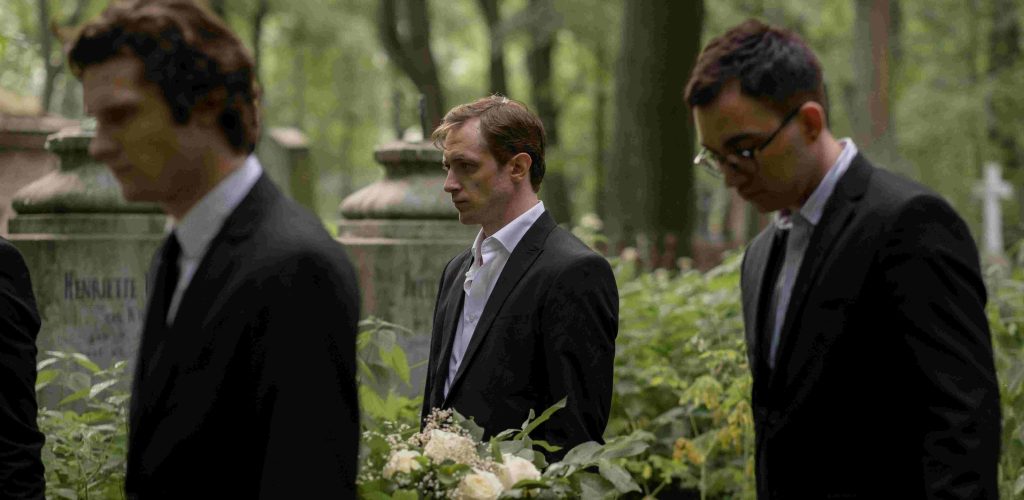- [email protected]
- Address placeholder, Country
When someone you love passes away, planning a funeral can feel overwhelming. But don’t worry, we’re here to help. In this guide, we’ll walk you through everything you need to know about UK funerals. We’ll cover what to wear, how to arrange the catering, how much a funeral costs, and give you a step-by-step guide to make the process easier. We’ll also discuss the growing trend of direct cremations as a more affordable alternative to traditional funerals. Watch the video below if you prefer

Planning a funeral in the UK might seem daunting, but it’s easier if you break it down into smaller tasks. Here’s a simple guide:

Choosing what to wear to a funeral can be tricky. In the UK, black is the traditional colour for funeral outfits. But don’t worry if you don’t have an all-black ensemble. Dark colours like navy or charcoal are also fine.
For men, a dark suit with a white shirt and black tie is a safe choice. Women can opt for a knee-length funeral dress or a skirt with a blouse or cardigan in a dark colour. Remember to wear sensible, comfortable shoes.
While black is the norm, some families may request guests wear brighter colours to celebrate their loved one’s life. If this is the case, it will usually be communicated in the funeral announcement or invitation.
Different religions and cultures have their own unique funeral traditions and dress codes. For example, at a traditional Jewish funeral, men wear a jacket and tie, while married women often cover their heads. At a Muslim funeral, both men and women dress modestly, with women wearing a headscarf. If you’re unsure about the appropriate attire, don’t hesitate to ask the family or consult the funeral director for guidance.

After the funeral service, there’s often a wake or reception. This is a chance for family and friends to gather, share memories, and support each other. The wake might be held at a family member’s home, a church hall, or even a pub.
Funeral catering can be a lot to handle when you’re grieving. That’s why many families hire a catering service to take care of the food and drinks. Others might ask guests to bring a dish to share. Sandwiches, quiches, and cakes are popular choices, along with tea and coffee.

One of the most common questions people have when planning a funeral is, “How much does a funeral cost?” In the UK, the average cost of a basic cremation funeral is £3,765. This includes the funeral director’s fees, cremation fees, doctor’s fees (if required), and minister or celebrant fees.
However, funeral costs can vary significantly depending on location and the services included. For example, the average cost of a cremation funeral in London is £4,260, while in Northern Ireland it’s £3,372.
Funeral director fees make up the largest portion of the cost, averaging £2,325. This covers the coffin, hearse, collection and care of the deceased, and professional services. Cremation fees average £776 across the UK.
Optional extras like flowers, catering, and memorial cards can add thousands to the final bill. In 2022, people spent an average of £2,669 on these additional items.
As funeral costs continue to rise, many families are seeking more affordable alternatives. One option that has gained popularity in recent years is direct cremation.
A direct cremation is a simple, unattended cremation without a funeral service. The cremation takes place at a time and date chosen by the crematorium, and the ashes are either scattered in the garden of remembrance or returned to the family.
The average cost of a direct cremation in the UK is aroud £1,000, prices range from £895 to £1195 from our research, making it significantly cheaper than a traditional cremation funeral.
By choosing a direct cremation, families can save money on many of the expensive extras associated with traditional funerals. Some use the savings to plan a more personalised memorial service or celebration of life at a later date.
It’s important to note that while direct cremation is the most affordable option, it may not be right for everyone. Some families may prefer a more traditional funeral service, even if it means paying more.

Should children attend a funeral?
If you’re wondering whether to bring children to a funeral, it depends on factors such as their maturity level, understanding of death, and relationship to the deceased. If there are concerns about disruption or distraction, it may be better to arrange for childcare.
What is funeral etiquette in the UK?
Funeral etiquette is another important consideration. Key aspects include arriving promptly, being respectful, turning off or silencing mobile phones, and dressing appropriately.
Can I have non-religious funeral in the UK?
For those who prefer a non-religious service, secular funerals are becoming increasingly common in the UK. The British Humanist Association can provide guidance on arranging a non-religious funeral.
What happens during a funeral procession?
During the funeral procession, the hearse carrying the coffin leads the way, followed by vehicles carrying close family members. Other mourners may follow in their own cars. The procession typically travels from the funeral home or place of worship to the crematorium or burial site.
When should I have the funeral?
In terms of timing, funerals in the UK typically take place within a week or two of the death. However, the exact timing can depend on factors such as the availability of the funeral director, the chosen venue, and the preferences of the family.
Do funerals happen at the weekend in the UK?
Yes, funerals can take place on weekends in the UK. However, it’s important to note that some crematoria and cemeteries may charge extra fees for weekend services. Additionally, not all funeral directors offer weekend funerals, so it’s essential to check their availability and pricing if you’re considering a weekend funeral. When deciding whether to have a weekend funeral, consider factors such as the availability of key attendees, travel arrangements for out-of-town guests, and any additional costs associated with a weekend service. Ultimately, the decision to hold a funeral on a weekend or weekday depends on the individual circumstances and preferences of the family.
UK funerals are a deeply personal and emotional experience, but understanding traditions and knowing how much a funeral costs can help make the process a little smoother. Remember, there’s no right or wrong way to say goodbye. Whether you choose a traditional service or a more affordable option like direct cremation, the most important thing is to come together and support each other through this difficult time.
The information provided in this article on UK funerals is for general informational purposes only and does not constitute formal legal advice. While we strive to provide accurate and up-to-date information, laws and regulations may change over time. For your specific situation, it is always best to consult with a qualified professional who specialises in wills and estate planning. They can guide you through the process of properly drafting and executing your will, ensuring it is legally valid and tailored to your unique needs. Services like XWills.com offer expert will writing assistance from licensed professionals. Speaking with them directly will give you the personalised attention and formal legal guidance needed to achieve your estate planning goals and protect your legacy.

Co-Founder, CEO and Senior Will Writer at Xwills.com
Andrew Walters is the co-founder and CEO of Xwills.com, an estate planning firm that combines technology with personalised customer service to elevate the will writing experience. As a full member of the Society of Will Writers, Andrew is committed to upholding the highest professional standards in the field.
Driven by a passion for providing comprehensive support to clients, Andrew pursued formal qualifications in will writing and estate planning. This journey led to the establishment of Xwills, where he and his team fill a gap in the market by offering a tailored alternative to online-only will writing services.
At Xwills, Andrew ensures that each client receives the time and attention needed to understand their specific requirements. He strongly believes that something as important as writing a will should not be rushed or done without expert guidance.
As a member of the Society of Will Writers, Andrew adheres to their code of practise and continues to expand his knowledge through annual training.
His expertise, combined with Xwills’ commitment to customer service, positions him as a trusted resource for those seeking to protect their legacy and provide for their loved ones.
With his dedication to professionalism and personalised service, Andrew Walters is setting a new standard in the estate planning industry.
0208 064 4088
Tilsop Farm,
Nash,
Ludlow,
Shropshire
SY8 3AX